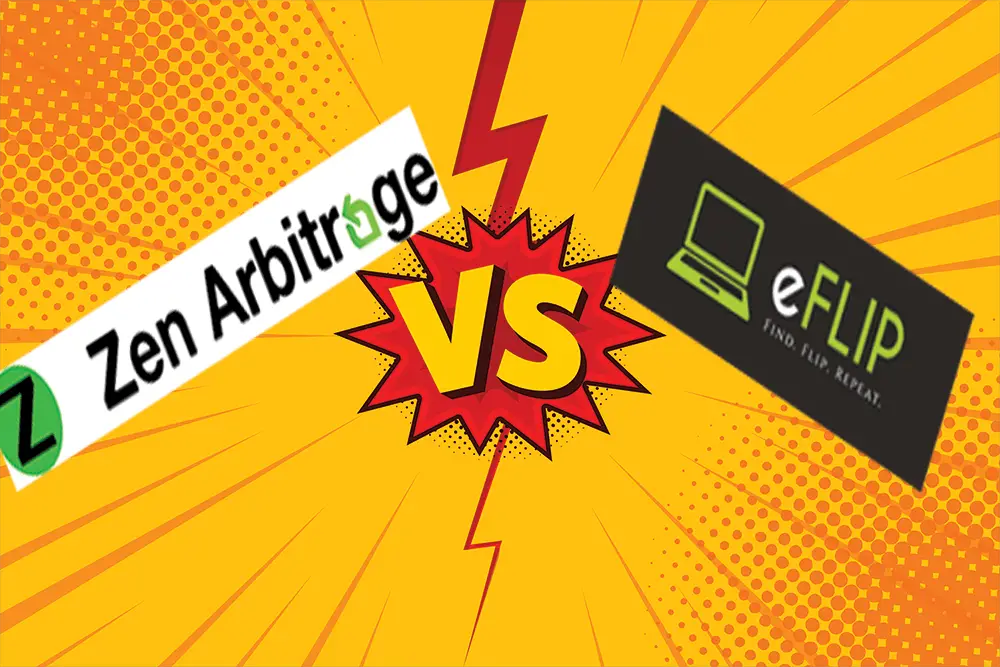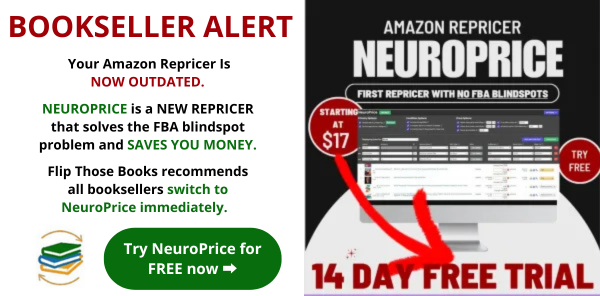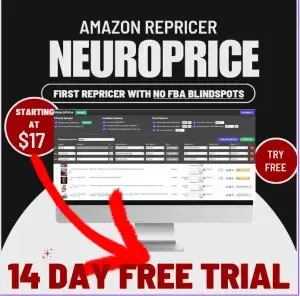Flip Those Books is an Amazon Associate. As an Amazon Associate we earn from qualifying purchases. We may also earn commissions if you purchase products from retailers after clicking on a link from our site.
Using the right book arbitrage software is really important.
Slight differences in software design can seriously slow down your book arbitrage workflow.
A slower book arbitrage workflow means you can’t source as many books.
And you know what sourcing fewer books means?
It means you make less money.
That’s why you need to use a book arbitrage software designed with a fast workflow in mind.
As you probably know, there aren’t too many options when it comes to book arbitrage software.
In fact, there are only two software programs created specifically for book arbitrage: eFlip and Zen Arbitrage.
Note: A lot of the people reviewing book arbitrage software tools have ZERO experience using them. They’re just in it for a quick buck, and they’ll say anything to get you to sign up for whatever software they’re pushing.
If you want an honest and accurate comparison of eFlip and Zen Arbitrage, you need to get it from someone who knows what they’re talking about.
I’ve used both eFlip and Zen Arbitrage extensively in the 2+ years I’ve been doing online book arbitrage.
I started out using eFlip in 2017, and then switched over to Zen after a few months.
As proof that I actually know what I’m talking about, here’s a small selection of the many book arbitrage flips I’ve done over the years.
The links will take you to pictures that prove I bought and sold these books at the prices listed — and I found every one of these books using book arbitrage software.
| Book Name | Buy Price | Sell Price | Days until Sale | Net Profit |
|---|---|---|---|---|
| Contract Law Fundamentals (6 copies) | $5.79 | $79.99 | 16 days | $314.46 |
| Urban Economics | $25.56 | $123.39 | 24 days | $70.45 |
| Understanding Post-Tonal Music | $31.89 | $144.31 | 52 days | $66.03 |
| Finite Mathematics | $43.99 | $138.41 | 19 days | $63.79 |
| Student Activities Manual | $19.94 | $94.99 | 18 days | $51.71 |
| Cognitive Psychology and Instruction | $39.18 | $110.05 | 43 days | $46.72 |
| Introduction to Learning and Behavior | $14.39 | $111.00 | 60 days | $72.32 |
| Research Methods in Education | $51.79 | $124.00 | 30 days | $45.45 |
| Major Problems in the Early Republic | $17.55 | $82.56 | 54 days | $45.00 |
| Microsoft Office 2016: A Skills Approach | $25.63 | $88.61 | 68 days | $41.00 |
| Foundations of Earth Science | $19.27 | $90.00 | 53 days | $48.70 |
| Government by the People | $11.03 | $75.00 | 45 days | $44.54 |
| Writing in the Health Professions | $29.10 | $93.99 | 34 days | $43.18 |
| Human Behavior and the Social Environment | $21.44 | $74.49 | 58 days | $34.25 |
| Educational Psychology | $26.29 | $139.99 | 55 days | $84.14 |
| Managing Classroom Behaviors | $28.09 | $74.95 | 39 days | $30.29 |
| Introduction to Developmental Psychology | $10.80 | $52.99 | 42 days | $25.64 |
| Chemistry: A Guided Inquiry | $12.70 | $49.95 | 11 days | $21.40 |
| Play, Development and Early Education | $28.76 | $95.00 | 26 days | $44.35 |
Okay, let’s get on with the comparison.
To figure out which book arbitrage software is better (and faster), I opened eFlip and Zen Arbitrage on each of my two computer monitors.
I then painstakingly compared each and every feature side-by-side to see what was different (and how much those differences actually mattered).
Here’s what I found:
On the surface, both eFlip and Zen Arbitrage seem pretty equal:
- Both allow you to search through Amazon’s catalog of books.
- Both let you fine-tune your searches with a suite of adjustable options.
- Both offer a free trial.
This is where the similarities end though.
After a few days of careful analysis, I found that Zen Arbitrage is clearly the better online book arbitrage software.
Here’s why:
1. Zen lets you filter out books lacking Amazon trade-in values. (Find valuable books faster)
2. Zen lets you check textbook restrictions with one click. (No wasting money on books you can’t sell)
3. Zen shows the lowest FBA price in the search results. (Lets you find profitable books faster)
4. Zen lets you color-code books you view or purchase. (Saves time when sourcing)
5. Zen has a customer service live chat. (Instant access to the developers)
6. Zen has a flip opportunity marketplace. (Find profitable books instantly)
7. Zen has more than 40 extra video tutorials. (Gain a deeper understanding of book arbitrage)
8. Zen’s text is significantly easier to read (Reading prices doesn’t give you a headache)
9. Zen lets you set email price alerts (Be instantly notified of profits)
10. Zen loads 150 more results per page. (Slightly faster sourcing workflow)
11. Zen lets you export your search results into an Excel/Google Sheets file. (Use higher-level automation techniques)
If you want to start making money with Zen Arbitrage today, click on the affiliate link below to start your 14-day free trial now.
Try Zen Arbitrage For Free. (14-Day Free Trial).
And if you want an in-depth analysis of the main differences between Zen Arbitrage and eFlip, read on.
1. Zen lets you filter out books lacking Amazon trade-in values.
This is one of the biggest reasons Zen is better than eFlip.
For those unaware, Amazon has a textbook trade-in program. They purchase used textbooks from students and resell them under the “Amazon Warehouse” vendor name.
You’ve probably seen the trade-in box on Amazon’s textbook pages.
The green number in that box is determined by an algorithm. This algorithm uses all of Amazon’s internal data to determine a textbook’s worth. It then offers to buy it for considerably less than that.
Unfortunately for us mere humans, Amazon’s algorithm is inconceivably better at judging a book’s value than we are. That’s why you need to use it when making purchase decisions.
While both eFlip and Zen show you the trade-in values, Zen is the only one to let you limit search results to books with trade-in values.
This means an eFlip user will get tons of books with no trade-in value cluttering their search results. Meanwhile, a Zen user won’t waste time sifting through untrustworthy books lacking trade-in values.
If the Zen user and the eFlip user source the same number of books, the Zen user will likely end up with a higher percentage of profitable flips because they can consistently use the most reliable indicator of a book’s value when making purchase decisions.
2. Zen lets you check textbook restrictions with one click.
Some textbooks on Amazon have selling restrictions.
If you’re a newer seller, you won’t be approved to sell every single textbook you buy.
To make it easy to identify restricted textbooks, Zen Arbitrage has a “Check Restriction” button next to every listing. Clicking this button will take you directly to the Amazon Seller Central listing for that book and tell you whether your account can sell it or not.
eFlip does not have this button. If you want to check textbook restrictions on eFlip, you’ve have to do it the slow way and click through from the product’s Amazon listing.
3. Zen shows the lowest FBA price in the search results.

 Being able to see the lowest FBA price while you’re still on the search results page is huge.
Being able to see the lowest FBA price while you’re still on the search results page is huge.
I can’t overstate how important this is: this single feature will let you source more than twice as fast.
To put things into perspective, here’s an example:
Let’s say you have a page of 100 search results open on both Zen and eFlip. The Zen results all display the lowest FBA price. The eFlip results don’t.
Every time you find a potential flip on eFlip, you’ll have to take the following steps:
- Click through to the Amazon offers page
- Wait for the page to load
- Click the “Prime” checkbox to take you to the FBA offers (unlike Zen, eFlip doesn’t take you directly to the FBA offers)
- Check the lowest FBA offer
- Click back to the eFlip page
- Close the FBA offers page
Let’s compare with Zen Arbitrage…
Every time you find a potential flip on Zen Arbitrage, you’ll have to take the following steps:
- Look at the lowest FBA price on the Zen search results page
And that’s it.
Can you see why it’s so important?
If you’re checking hundreds of books an hour, that 6-step process eFlip makes you go through will waste a ton of time.
And the problem only compounds if you have a slow computer or laggy internet.
If you use Zen, you’re going to get through that page of 100 books much faster than you would if you were using eFlip.
4. Zen lets you mark books you view or purchase.


The first time you look at a book’s product page, you should be marking the book as viewed in your arbitrage software so you don’t waste time checking it again.
Because Zen lets you mark books you review or purchase, Zen users can maximize their sourcing time by avoiding duds they’ve already checked.
eFlip doesn’t offer any sort of marking system. This means eFlip users will waste time looking at books they’ve already looked at, while Zen users can use that extra time to source fresh books and make more money.
5. Zen has a customer service live chat.


If you need help using the software, reaching out to the developers is often your best bet.
Zen Arbitrage offers a convenient and responsive live chat just for its subscribers.
They usually answer within a few hours, and if you close the live chat window, their response will go to your email.
eFlip only has a contact form on a web page.
I haven’t contacted them about anything, so I can’t speak to their responsiveness.
But you wouldn’t be able to get an instant, on-screen response — you’d have to wait for an email.
6. Zen has a flip opportunity marketplace.
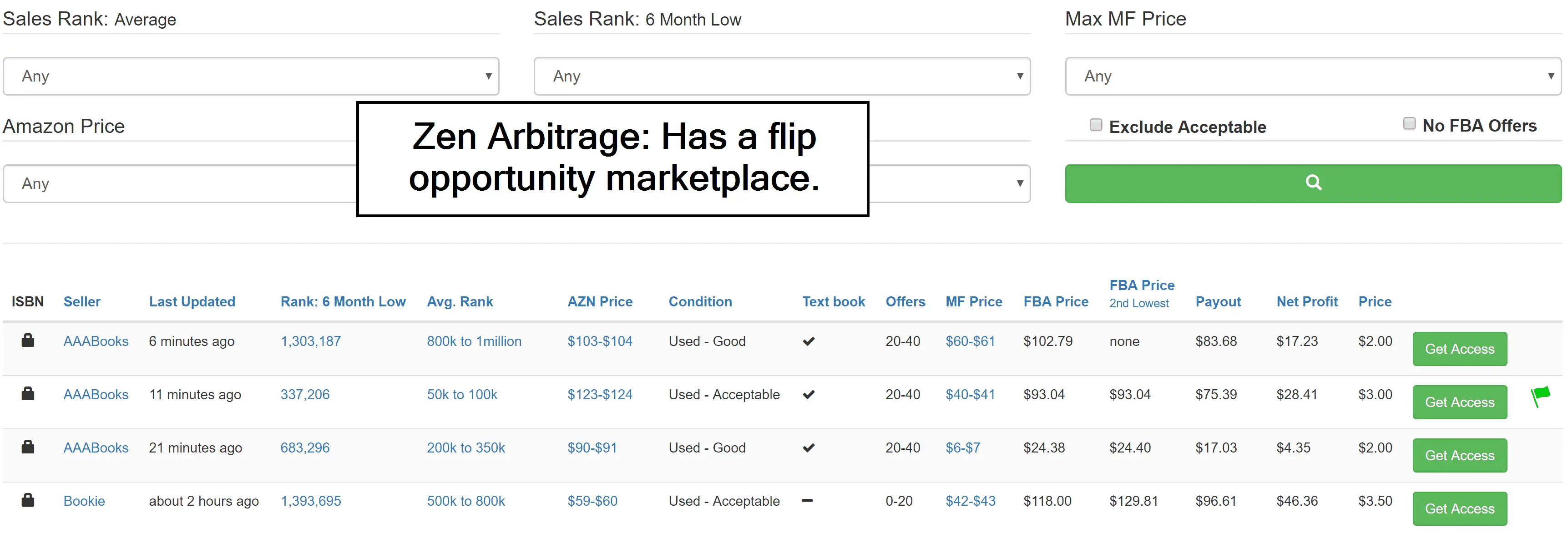
If you’ve got more money than time, Zen Arbitrage lets you put that money to use by allowing you to pay people to tell you about profitable books.
The going rate is about 10% of the net profit for the flip. So if a book stands to make you $50, the lead will usually cost about $5. — not a bad price to pay for an instant lead.
And if you find a profitable flip that you don’t want to shell out the cash for, you can still profit from it by listing it in the marketplace.
As many flips make $50+, the payout is pretty good for just looking through some Amazon product pages.
7. Zen has more than 50 video tutorials.
Zen Arbitrage’s resources section has more than 50 in-depth video tutorials about using their software, sourcing books online, and other Amazon FBA tips.
These videos are also pretty high-quality, and I must say I learned a lot of useful information from them.
On the flip side, eFlip only has 9 video tutorials.
I also didn’t find them as nuanced or informative as Zen’s videos were, which is a real problem if you’re still learning the book arbitrage ropes.
8. Zen’s text is significantly easier to read.
This one might seem like I’m being nitpicky, but text size and font genuinely make a difference.
Compare the font on Zen with the font on eFlip:
Zen Arbitrage font:
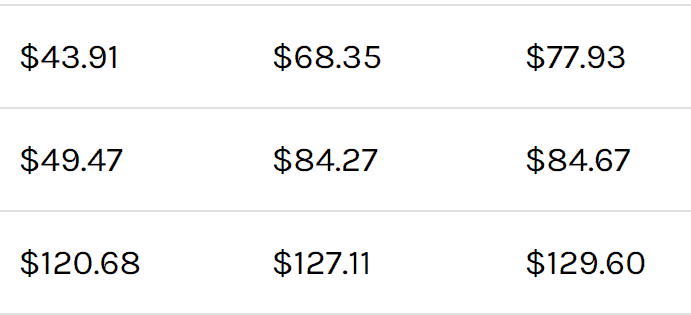
eFlip font:
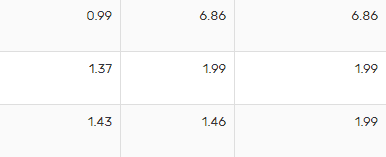
eFlip‘s font is thinner and smaller, which makes it much harder to read.
The text is also formatted to stick to the right side of the column, which is the opposite of what you as a website user have come to expect.
This poor font choice is annoying and will slow down your sourcing speed.
9. Zen lets you set email price alerts.


Email-based price alerts can instantly notify you when a book drops in price – making them a critical part of your book arbitrage toolkit.
While you can use Keepa to set price alerts, Keepa maxes out at 5,000 alerts.
If you hit that mark, you need to move to another tool for alert setting.
eFlip does not have price alerts, but Zen does.
If you use Zen to source books, you can set email price alerts right from the search results page. This will enable you to take advantage of repricer errors that temporarily send book prices plummeting.
Note: I highly recommend setting alerts if you aren’t doing so yet — some of my best flips have come from price drop alerts that let me know about lucrative repricer error deals.
10. Zen loads 150 more results per page.
Zen loads a maximum of 250 search results on one page. eFlip maxes out at 100.
This isn’t a huge deal, but clicking to a new page when you’re focused and in the zone will break your concentration and cost a bit of time.
It also takes Zen a bit of time to load all of the FBA offers, so a larger results page means less time waiting for that critical information to pop up.
11. Zen lets you export your search results into an Excel/Google Sheets file.

 This is actually pretty important.
This is actually pretty important.
If you get rather good at book arbitrage, you’re going to start using Excel/Google Sheets functions to organize and process data.
If you use eFlip, you can’t make Excel or Google Sheets optimize your sourcing process, which kind of sucks.
Conclusion
If you’re doing online book arbitrage, you should be using Zen Arbitrage as your software tool.
While it shares some basic similarities with the competition, it offers a truckload of extra features that will streamline your sourcing process and let you source more books per hour… which means you’ll make money overall.
To start making money with Zen Arbitrage today, click on the affiliate link below to access your 14-day free trial now.

